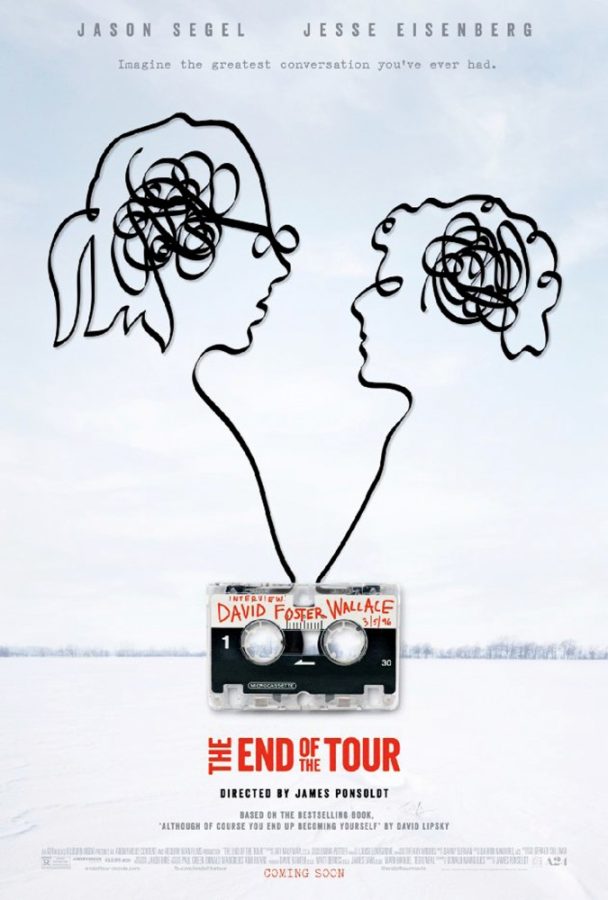The extended conversation between a music journalist and one of America’s most iconic authors makes for extremely compelling fare on the big screen. “The End of the Tour,” which relies on the memorable performances of Jesse Eisenberg and Jason Segel, is one of the year’s best films.
In 1996, writing for Rolling Stone, David Lipsky spent five days on the road with author David Foster Wallace during his book tour of “Infinite Jest.” Wallace’s seminal 1,079-page tome had propelled him into the center of the limelight of the literary world, and, to a slightly lesser extent, popular culture at large. The article Lipsky would write on his experience was never published, but in 2010 his time with Wallace was chronicled in his book, “Although Of Course You End Up Becoming Yourself.”
In “The End of the Tour,” Eisenberg plays Lipsky, who is tired of writing 500 words of fluff for Rolling Stone. A massive novel from an author who lives in suburban Illinois is making waves in the literary community, presenting Lipsky the opportunity he so keenly desires. A recently published novelist in his own right, Lipsky sees Wallace as peer, rival and measuring stick. Although skeptical of the praise being bestowed onto the novel and its creator, Lipsky can only muster a resentful, conceding “Shit” when he finally sits down and reads “Infinite Jest” in his modern, well-decorated New York City apartment.
His clean, metropolitan style of living is not what greets him in snowy Illinois. The bandana-ed, long-haired Wallace, played by Segel, lives alone with his two large, black, mixed-breed dogs in a house littered with bric-a-brac and soda cans. Of course, the contrasts extend to the men themselves.
The perfect summation is that Wallace introduces himself as Dave, while Lipsky prefers his proper, two-syllabled first name. Both interviewer and interviewee wear their personalities on their sleeves. Lipsky stakes his identity on his intellect and education; he wears his smarts as a badge and he wants it to be the shiniest, biggest badge in the room. Wallace, on the other hand, presents himself as colloquial and unassuming; he’s as Midwestern as flannel. He’s not one to overtly wield his intellect like the sizeable asset that it is. Throughout the course of the five days they spend together in the close quarters of cabs and hotels, Lipsky will try to unearth the enigma that he makes Wallace out to be. Wallace, not one to give in easily to inquests into his deeply guarded personal life, isn’t exactly forthcoming with information at first.
This one-sided quid pro quo is the core of the movie; it’s one man trying to get another to open up about himself. It’s simple, and probably wouldn’t hold weight if it weren’t for the talents behind and in front of the camera.
Segel as Wallace is the revelation, as much having to do with the talent of the performance as it does him going against his established comedic identity. The “How I Met Your Mother” co-star begins well-spoken and mellow, but will explore emotional depths as he allows us into Wallace’s unsettled, albeit well-meaning, inner life. Of course, as to be expected from Eisenberg, he delivers a characteristic performance, both in quality and in character. Both actors are dynamic with and against each other.
They are given exquisite dialogue from screenwriter Donald Margulies and director James Ponsoldt. Ponsoldt works supremely well with character foils; his teenage coming-of-age story “The Spectacular Now” saw a popular boy and nerdy girl interact in authentic, unaffected light. Here, too, each character is revealed in their relationship to the other; Lipsky calls out Wallace for being a phony in his regular guy-ness, and Wallace counters that Lipsky just has an agenda that he needs to adhere to. As much as they butt heads initially, they come to appreciate and even enjoy each other’s presence, and that is the ultimate victory for two seemingly diametrically opposed people.
“The End of the Tour” is currently playing at The Loft Cinema.
A-
Follow Alex Guyton on Twitter.









